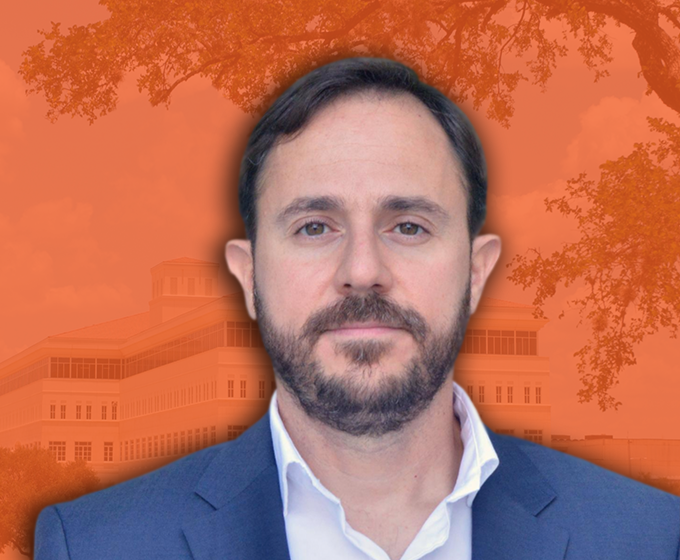
Nikolaos Gatsis believes the smart grid concept offers several benefits to manage electricity demand.
MARCH 2, 2021 — Statewide power outages during February’s polar vortex have lawmakers and utility executives assessing the viability of our current electric grid. ERCOT and local utility operators in Texas are being asked tough questions about what went wrong and what will be done to prevent extensive blackouts from happening again. Supporters of full-scale smart grids believe this should be an integral part of the state’s future energy strategy.
Nikolaos Gatsis, UTSA assistant professor of electrical and computer engineering and Lutcher Brown Endowed Fellow, teaches a senior level class on power systems analysis and has extensive knowledge on smart grids and smart cities. He believes the smart grid concept offers several benefits to manage electricity demand and coordinate power generated from traditional and non-traditional sources.
“A smart grid involves a host of technologies and operating procedures that make energy delivery more reliable and economical, and that’s something we’re all looking for,” said Gatsis.
On the operational side, smart grids use GPS software to control the transmission and distribution of electricity. A downside is the software is under constant attack from an array of cyber-hackers. Gatsis, and fellow UTSA researchers David Akopian and Ahmad F. Taha, along with Ph.D. graduate students Ali Khalajmehrabadi and Erick Schmidt, developed an effective computer algorithm that mitigates the effects of GPS spoofing attacks on electrical grids and other GPS-reliant technologies.
“Algorithms are the key and there is certainly a need for continued development of smart algorithms to use in control technology,” said Gatsis. “Governmental agencies are very interested in advancements in algorithms to protect against cyber-attacks. Through our research at UTSA, we have made significant strides in security of critical infrastructures such as the GPS and the power grids.”
An aspect of the smart grid is the interaction between electricity and water. Through a $500,000 grant from the National Science Foundation, Gatsis is studying how electricity distribution networks and water distribution systems can work in tandem to provide more a reliable and cost-effective service to consumers.
“There’s a lot of interdependency because water pumps rely on electricity. Our smart grid approach would use technology to schedule water pumps to run when prices are the cheapest and with minimal load impact on the grid,” Gatsis explained. “The use of specialized turbines is another smart grid possibility to increase or reduce pressure through computerized controls. They can even potentially be used to generate electricity for self-operation or distribute energy back into the grid.”
Smart grids also involve continued use of renewable energy sources. Gatsis maintains these renewable energy sources should be a growing part of our state’s energy portfolio. While solutions could be developed to help keep wind turbines from freezing, solar panels continue to produce energy in 10-degree temperatures as long as the sun is shining, which it was during San Antonio’s coldest day of the winter blast.
“When solar panels are mounted on rooftops, the consumer now becomes a power generator and this has a cumulative effect on reducing demand from the grid,” Gatsis said.
For Gatsis and many other proponents, the many benefits of smart grids and smart cities are clear. The question is whether utility executives and state lawmakers can pivot to an electricity generation mindset that relies more on technology and continued adoption of renewable energy sources.
“The technology exists to move forward but the question is whether the electric management authorities in Texas are now willing to implement it.”
UTSA Today is produced by University Communications and Marketing, the official news source of The University of Texas at San Antonio. Send your feedback to news@utsa.edu. Keep up-to-date on UTSA news by visiting UTSA Today. Connect with UTSA online at Facebook, Twitter, Youtube and Instagram.
Move In To COLFA is strongly recommended for new students in COLFA. It gives you the chance to learn about the Student Success Center, campus resources and meet new friends!
Academic Classroom: Lecture Hall (MH 2.01.10,) McKinney Humanities BldgWe invite you to join us for Birds Up! Downtown, an exciting welcome back event designed to connect students with the different departments at the Downtown Campus. Students will have the opportunity to learn about some of the departments on campus, gain access to different resources, and collect some giveaways!
Bill Miller PlazaJoin us for an intimate evening of cocktails, conversation, and culinary inspiration with Pati Jinich, Emmy-nominated chef and James Beard Award-winning author. Enjoy light bites and signature drinks in the warm, modern setting of Mezquite as Pati connects with guests over her passion for Mexican cuisine and storytelling.
Mezquite Restaurant in Pullman Market, 221 Newell Ave., San Antonio 78215From inspired courses to thoughtful pairings and a rich sense of community, the Ven a Comer Signature Dinner is a night of shared meals, shared stories, and unforgettable flavor.
Stable Hall (Pear Brewery), 307 Pearl Pkwy, San Antonio 78215Come and celebrate this year's homecoming at the Downtown Campus with food, games, giveaways, music, and more. We look forward to seeing your Roadrunner Spirit!
Bill Miller PlazaThe University of Texas at San Antonio is dedicated to the advancement of knowledge through research and discovery, teaching and learning, community engagement and public service. As an institution of access and excellence, UTSA embraces multicultural traditions and serves as a center for intellectual and creative resources as well as a catalyst for socioeconomic development and the commercialization of intellectual property - for Texas, the nation and the world.
To be a premier public research university, providing access to educational excellence and preparing citizen leaders for the global environment.
We encourage an environment of dialogue and discovery, where integrity, excellence, respect, collaboration and innovation are fostered.